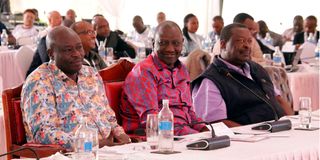Premium
President Ruto makes changes to ministries in new order

President William Ruto, his deputy Rigathi Gachagua and Prime Cabinet Secretary Musalia Mudavadi at the Inaugural Retreat for Cabinet and Senior Ranks of the Executive at Fairmont Mount Kenya Safari Club in Nyeri County on January 7, 2023.
What you need to know:
- The DP’s and Prime Cabinet Secretary’s offices now have fully-fledged state departments and additional responsibilities.
President William Ruto has reorganised his government after just three months, splitting some key ministries into more state departments, renaming others and reassigning some functions.
Deputy President Rigathi Gachagua was given the additional responsibility of overseeing the Coffee Sub-Sector Reforms Implementation Standing Committee through Executive Order No. 1 of 2023 issued yesterday by the President.
The team is tasked with checking the performance of the crop that has been stalked by controversy and which was a popular campaign tool. Politicians and farmers have called for guaranteed minimum returns.
Under the changes, the DP’s office as well as that of the Prime Cabinet Secretary Musalia Mudavadi will now each have two substantive Principal Secretaries, following the elevation of the holders initially designated Principal Administrative Secretary in the Executive Order of October 12, last year.
The two senior offices did not have fully fledged PSs yet all ministries had state departments run by PSs who are accounting officers. The two Principal Secretaries in the Deputy President’s office are Mr Julius Korir in charge of Cabinet Affairs – initially the docket had been named Administration and Coordination – and his Devolution counterpart Teresia Malokwe.
Mr Mudavadi, whom President William Ruto announced will guide the working relationship between Parliament and the Executive, now has two principal secretaries – Parliamentary Affairs and Performance and Delivery Management – whose holders are Ms Aurelio Rono and Ms Esther Ngero, respectively.
Mr Mudavadi’s chief of staff will be Mr Joseph Busiega and the Prime CS will now be in charge of Government Delivery Services (GDS) and not the Government Delivery Unit (GDU) as indicated in the previous order.
Among the ministries split into additional state departments or renamed are the ones overseen by Mr Moses Kuria (Trade), Ms Soipan Tuya (Environment), Ms Alice Wahome (Water) and Dr Susan Nakhumicha (Health).
In a statement, Chief of Staff and Head of Public Service Felix Koskei said the new executive order supersedes the one issued on October 12, 2022.
“The Executive Order is issued following the full constitution of Cabinet, the ranks of principal secretaries in all ministries and state departments and the other senior ranks of the Executive,” Mr Koskei wrote.
The Ministry of Investment, Trade and Industry has now been split into three state departments – Investments Promotions, Trade and Industry headed by PSs Abubakar Hassan, Alfred K’Ombudo and Dr Juma Mukhwana, respectively.
To combat effects of climate change, President Ruto has established the state department for Environment and Climate Change in addition to the state department for Forestry under Ms Tuya’s ministry.
Mr Festus Ng’eno will head the Environment and Climate Change department while Ephentus Kimani will head Forestry.
In his Jamhuri Day speech on December 12, President Ruto said his administration is committed to planting 15 billion trees on 11 million hectares in every part of Kenya by 2032.
“Our objective is to increase the national tree cover from the current 12 per cent to 30 per cent over that period. This programme will be implemented through the Ministry of Environment in collaboration with county governments and many other stakeholders, local and foreign,” he said.
As part of his dream of greening Nairobi city, he said his administration will work with the county government to recruit at least 11,000 young people to grow a minimum 1.5 million trees in the city’s open and public spaces.
The ministry of Water, Sanitation and Irrigation has also seen the elevation of irrigation into a state department.
Dr Paul Ronoh will be in charge of Water and Sanitation as PS while his counterpart Gitonga Mugambi will steer the Irrigation docket.
The creation of the irrigation docket is seen as part of the President’s wider plan to liberate the country’s agricultural production from dependence on rainfall patterns and the effects of climate change
“We must produce food throughout the year. We have identified 100 dams in various parts of the country to double the land under irrigation from the current 670,000 acres, and progressively increase it to three million acres,” the President has said.
The Health docket has also been split into two state departments – Medical Services led by Peter Tum and Public Health and Professional Standards under Dr Josephine Mburu.
Under Prof Kithure Kindiki’s Interior ministry is the newly renamed state department for Immigration and Citizen Services, which was previously only referred to as Citizen Services.
Further, in the changes, State House spokesperson Hussein Mohammed has been stripped of his role as deputy head of the Presidential Communication Service (PCS).
The new executive order issued by the president is said to have been mooted during the four-day Cabinet retreat at the Fairmont Mount Kenya Safari Club in Nanyuki in a bid to enhance the delivery of the President’s manifesto.
On Sunday, the President announced that he had put in place a plan that will transform the nation and ensure the country’s economic revival.
He said he had aligned members of the Executive with his dream to bring prosperity to the country.
President Ruto added that each of the members of the Executive had been given specific tasks to ensure responsibility and improve service delivery.





